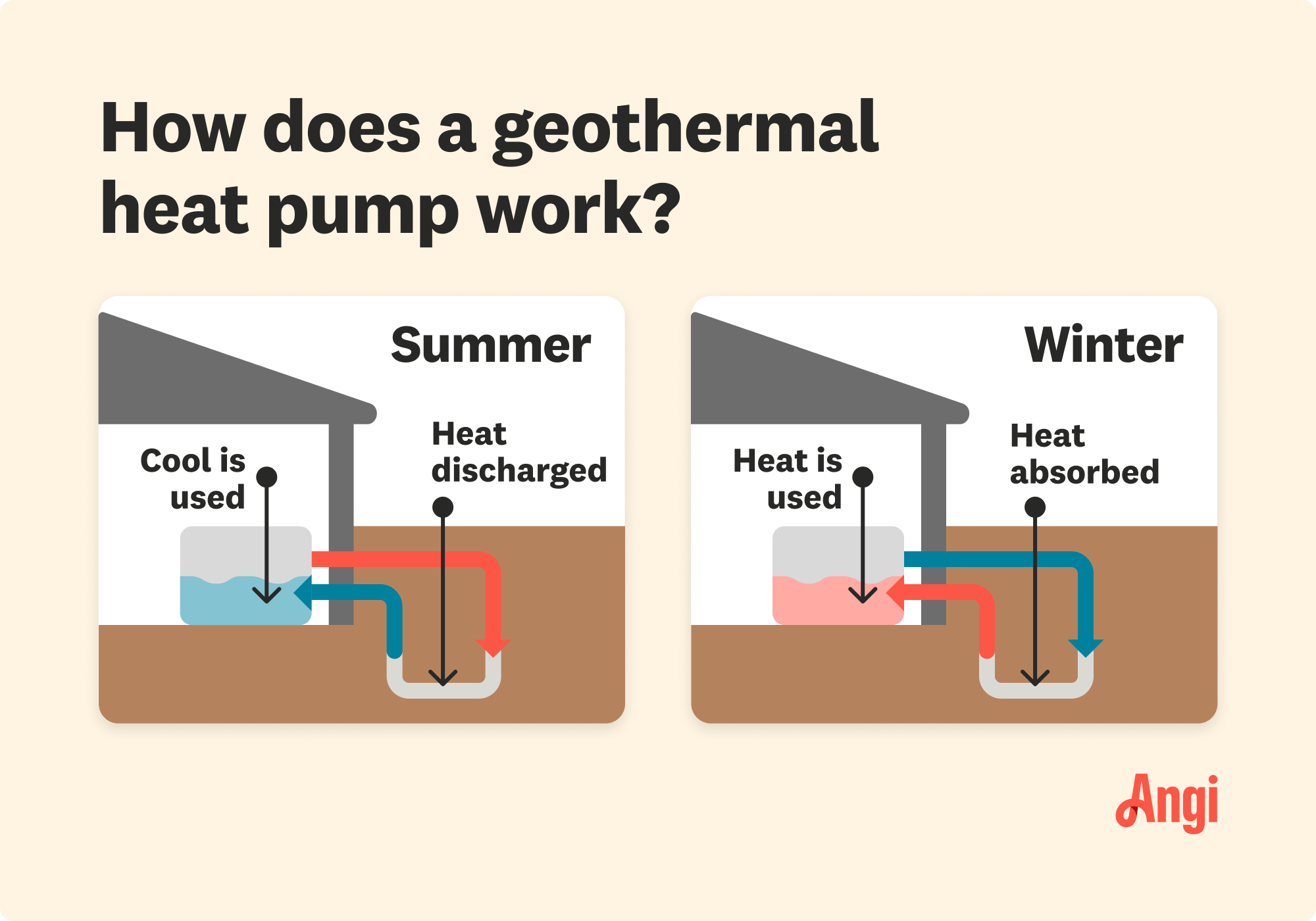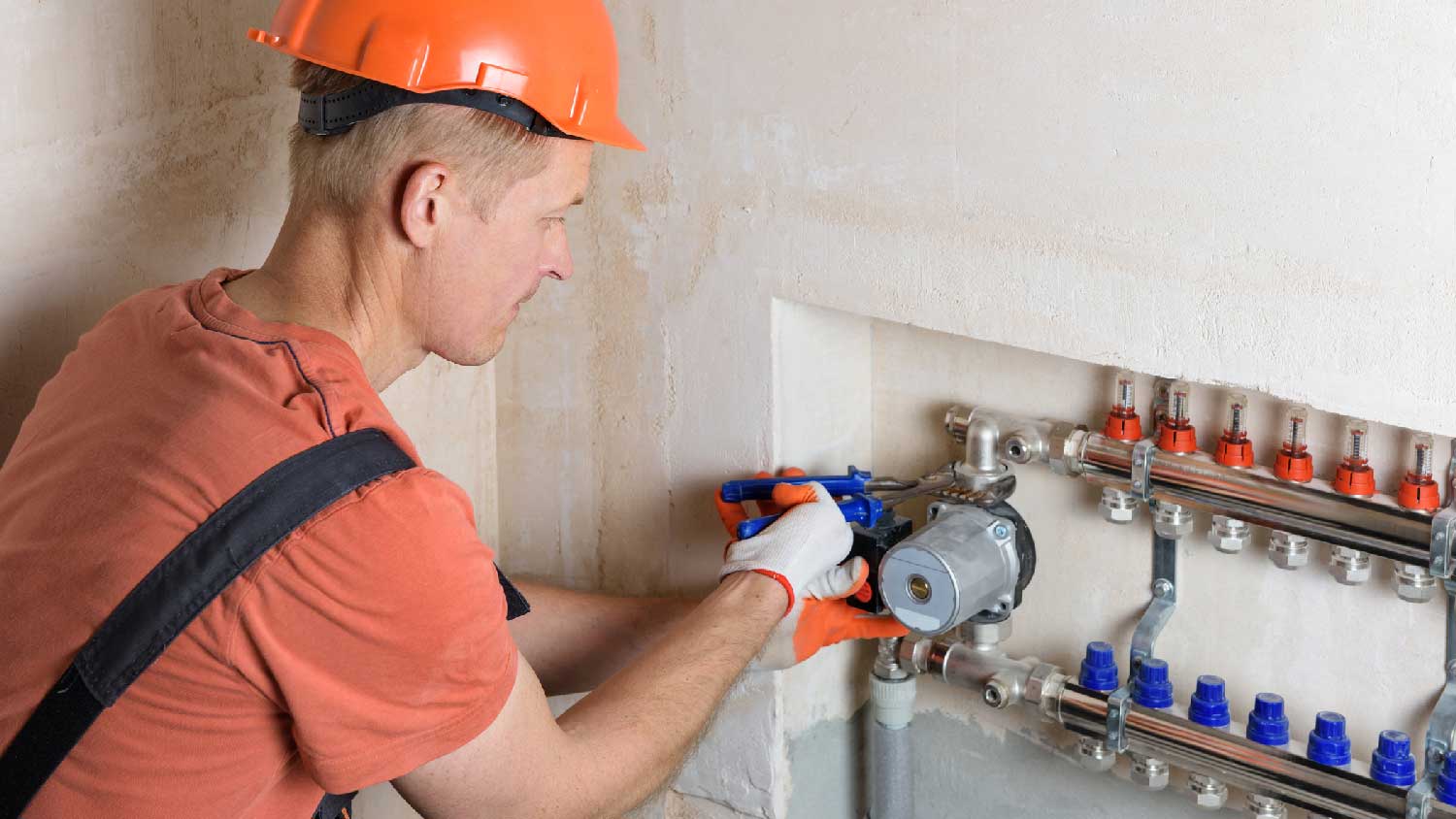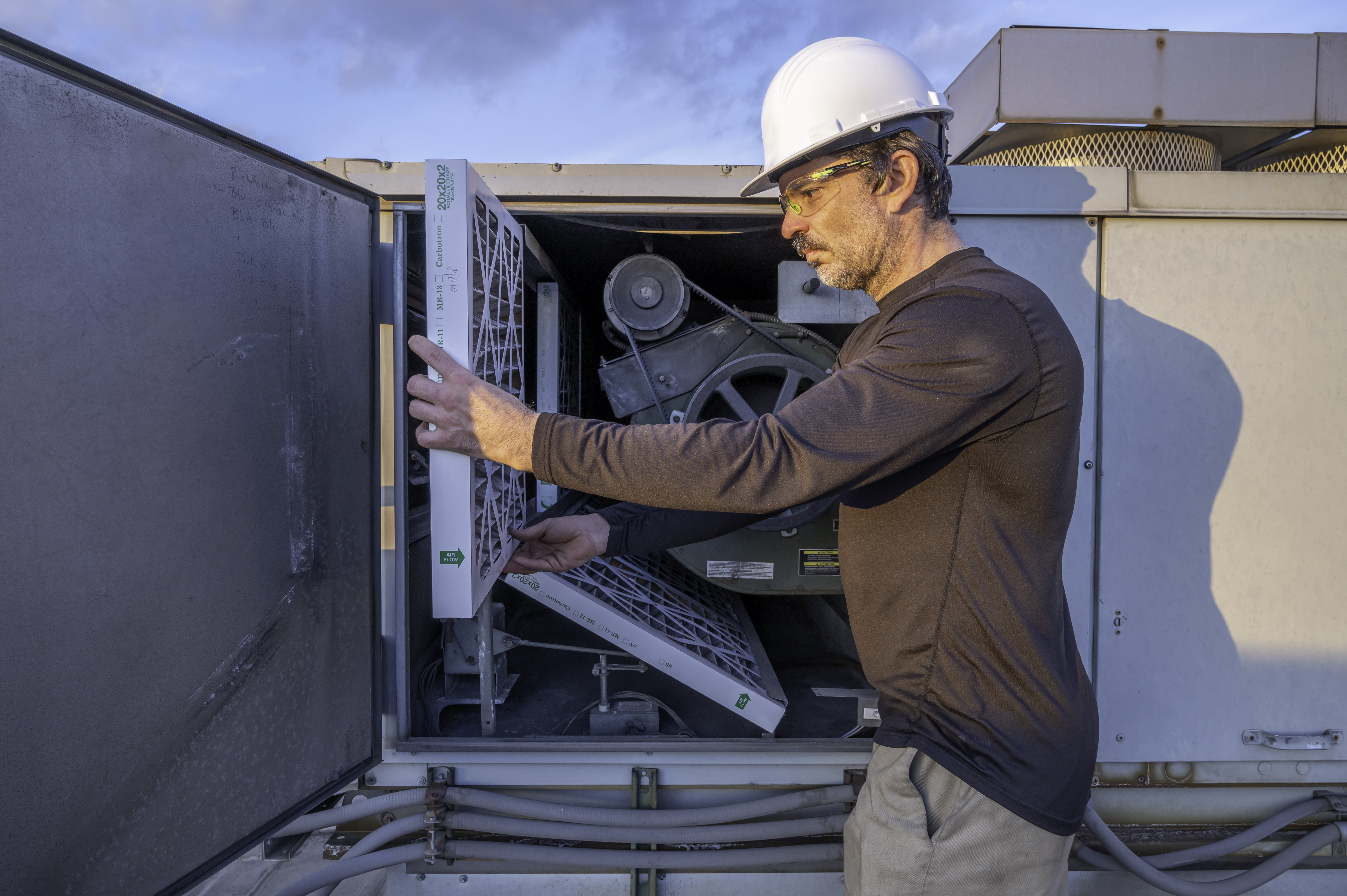
Regularly replacing your HVAC filter regularly is vital for a healthy system. Learn how much an HVAC filter replacement costs with this informative guide.
Looking to make your home more environmentally friendly? A geothermal pump can help
Geothermal systems can reduce electricity usage for heating and cooling by up to 70%.
Installing a geothermal heat pumfrom $18,000 to $30,000.
You can choose between horizontal, vertical, and pond/lake geothermal pump systems.
Imagine a technology that taps into Earth's natural warmth to heat and cool your home without the environmental toll of traditional HVAC systems. Geothermal heat pumps use the steady temperature below ground to regulate indoor climate year-round efficiently. Let’s take a look at how geothermal pumps work, their pros and cons, and what they can cost.
A geothermal pump, also known as a geothermal heat pump or ground source heat pump, is an innovative and energy-efficient heating, ventilation, and air conditioning (HVAC) system that harnesses the earth's natural heat to regulate indoor temperatures.
Unlike traditional heating and cooling systems that rely on fossil fuels or electricity, geothermal pumps utilize the stable temperature of the earth's crust, typically found a few feet below the ground's surface.

This technology works by circulating a water-based solution through a loop of underground pipes called a ground loop. The process depends on whether the heat pump is heating or cooling the home.
Here is how the heat pump works during the winter:
Heat absorption and transfer: The earth's natural warmth is absorbed by the circulating fluid in the pipes, which is pumped into the geothermal system located inside the building.
Heat exchange and compression: The heat from the fluid is transferred to a refrigerant through a heat exchanger where it is compressed. This process raises its temperature and increases the heat content.
Heat distribution: The heat is extracted and distributed throughout the structure using conventional ductwork or radiant heating systems.
In the summer, the process is reversed: Excess heat from indoors is transferred back into the Earth through the ground loop, providing efficient cooling.
Geothermal heat pumps can operate efficiently in a wide temperature range. The ground temperature a few feet below the Earth's surface remains relatively constant throughout the year, typically between 45 and 75 degrees Fahrenheit in most regions. Geothermal systems can efficiently extract heat from the ground even when air temperatures are very cold.
The cost of a geothermal heat pump system can vary significantly based on several factors, including the type of system, the size of the property, the geology of the site, and the specific features of the installation. The total cost includes both the equipment and the installation expenses.
Horizontal system: The installation cost for a horizontal system typically ranges from $20,000 to $25,000 for an average-sized home.
Vertical system: Vertical systems, being suitable for smaller spaces, might cost between $25,000 and $30,000 due to the drilling requirements.
Pond/lake system: Pond or lake systems are usually more affordable, averaging between $18,000 and $23,000, provided there’s a nearby water source.
Consider these cost factors that will affect the total bill of your geothermal heat pump installation and maintenance.
Property size: Larger properties require more extensive loop systems, increasing costs.
System size: The heating and cooling capacity needed for the property affects the pump's size and cost.
Installation complexity: Difficult terrains or complicated drilling can escalate installation expenses.
Additional features: Features like smart thermostats or advanced filtration systems can add to the overall cost.
Location: Local labor costs, geological conditions, and regional demand can impact the total expense.
It’s always a good idea to get quotes from multiple reputable geothermal heat pump contractors who can assess your specific needs and provide accurate estimates. While the initial cost of geothermal systems is higher than traditional HVAC systems, the long-term energy savings often outweigh the upfront investment, making geothermal heat pumps a cost-effective and environmentally friendly choice for many homeowners.

Like any system or appliance in your home, there are both advantages and disadvantages to be aware of before installing a geothermal pump.
Let’s start with the pros of geothermal heat pumps:
Energy efficiency: Geothermal systems are highly energy-efficient, reducing electricity usage for heating and cooling by up to 50 to 70%. They utilize the stable temperature of the earth, providing consistent efficiency year-round.
Environmentally friendly: Geothermal pumps produce significantly lower greenhouse gas emissions than fossil fuel-based systems, like oil or gas. They don’t rely on combustion, making them a great choice for environmentally conscious individuals who want to shrink their carbon footprint.
Lower operating costs: Although installation costs can be high, geothermal systems have lower operating and maintenance costs, leading to significant savings over the long term.
Durability and longevity: Geothermal systems have fewer mechanical components and are mostly located indoors, increasing their lifespan. Well-maintained systems can last for decades.
Versatility: Geothermal systems offer both heating and cooling capabilities. They can also provide hot water, offering a comprehensive solution for household needs.
Potential tax benefits: The government offers a tax credit to promote the installation of geothermal systems, making them more financially attractive for homeowners (we’ll break down how this works later on).
Here are the drawbacks to consider when deciding if a geothermal heat pump system is right for you:
High initial cost: The upfront installation cost of a geothermal system, including ground loop installation, can be significantly higher than traditional HVAC systems. This cost may deter some homeowners despite long-term savings.
Site limitations: Geothermal systems require adequate land space for ground loop installation. In urban areas or smaller properties, finding sufficient space for the loops can be challenging.
Installation complexity: Installation involves drilling boreholes or trenches for the ground loop. Improper installation can affect system efficiency, emphasizing the need for professional installation.
Location-specific: Geothermal systems may not be viable in areas with limited access to the Earth's subsurface or where regulations restrict drilling.
Specialized maintenance: While geothermal systems have fewer components, they require specialized knowledge for maintenance and repairs. Not all HVAC technicians are experienced in servicing geothermal systems.
Upfront planning: Proper planning and assessment of the site are crucial. Incorrect sizing or inadequate research can lead to suboptimal performance.
| Type of Heat Pump | Pros | Cons | Cost |
|---|---|---|---|
| Horizontal System | Higher efficiency and cost-effective | Requires a large amount of land and may be more susceptible to damage | $20,000–$25,000 |
| Vertical System | Space efficient and ideal for residential and commercial properties | More expensive to install and may require permits for drilling | $25,000–$30,000 |
| Pond/Lake System | Eco-Friendly and energy efficient | Requires access to pond or a lake and has potential for water body limitations | $18,000–$23,000 |
There are many different types of heat pumps, including geothermal heat pump systems. If you aren’t sure which type is right for your home, you can always hire a local heat pump installer for their professional insight.
In this setup, coils or straight runs of polyethylene pipe are nestled within six-foot-deep trenches. While cost-effective, it demands substantial open space. For instance, a 2,000-square-foot. home necessitates 400 feet of two-foot-wide trenches, making it a suitable choice for properties with ample land.
Vertical systems are the go-to solution when space is limited. Holes, approximately four inches in diameter, are drilled about 15 feet. apart and 100 to 400 feet deep. Two pipes, connecting at the bottom, are inserted into these holes. This method maximizes geothermal utilization, making it ideal for both residential and commercial spaces with restricted surface area.
For locations near water bodies, the pond/lake system draws heat from water instead of soil. Coils, anchored on racks about 10 feet. deep, are covered by a blanket of water. This configuration provides a cost-effective heat pump solution, capitalizing on the stable temperatures of nearby water sources, making it an environmentally friendly choice for geothermal energy extraction.
It is possible to have a geothermal system retrofitted to your home. However, the cost will depend on several factors, such as the size of your property, the type of HVAC system, and the type of geothermal heat pump system.
To install a heat pump, you will usually need to acquire a permit or, in some cases, multiple permits. The cost of permits depends on your location but can range between $50 and $300.
You should consider hiring a geothermal heat pump installation company near you to assess your home and property to determine whether you can retrofit a geothermal system to your existing HVAC system.
Determining whether a geothermal pump is right for your home depends greatly on how you want to spend your money. While geothermal heat pumps are highly efficient and can significantly reduce energy bills, the upfront cost of installing a geothermal system can be higher than other heating and cooling options.
It’s important to assess your budget and long-term savings potential. Additionally, your home’s geographical location matters a lot—geothermal systems are most efficient in regions with moderate heating and cooling needs. They may not be the most cost-effective choice in extreme climates.
Furthermore, the availability of suitable land for the installation of ground loops or the presence of an accessible water source (for water-source heat pumps) is crucial. Conducting a site assessment with a qualified professional is essential to determine the feasibility and potential efficiency of a geothermal system for your property.
If you're looking for a sustainable, energy-efficient solution and have the initial budget, live in a moderate climate, and have suitable land or water sources, a geothermal heat pump could be an excellent choice for your home, offering long-term energy savings and environmental benefits.
From average costs to expert advice, get all the answers you need to get your job done.

Regularly replacing your HVAC filter regularly is vital for a healthy system. Learn how much an HVAC filter replacement costs with this informative guide.

Exposed ductwork can be a smart choice even beyond aesthetics. Fortunately, exposed ductwork costs are relatively low, and easy access keeps repair costs to a minimum.

What you’ll pay in Columbus, OH, for furnace repairs depends on many factors. Here’s a breakdown of what can go wrong and the cost to fix those issues.

There are a few different types of refrigerant for AC systems, but some contain environmental hazards. Learn about the five main types of refrigerant.

Wondering who to hire for swamp cooler installation? Learn when to call an HVAC contractor, electrician, or handyperson, and what to expect.

Learning how to secure a window AC unit will avoid personal injury and damage to your home. It will also protect against theft and break-ins.